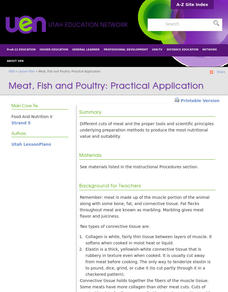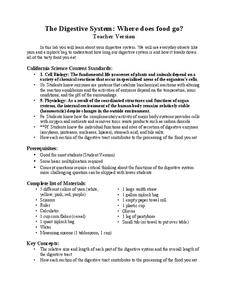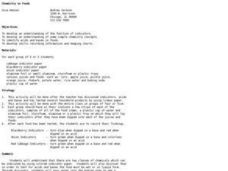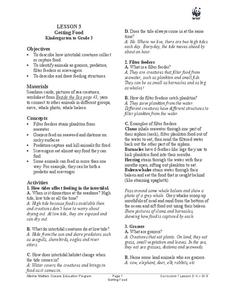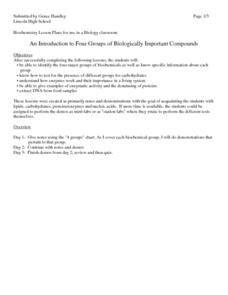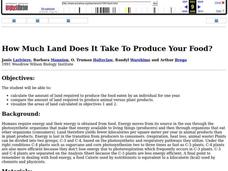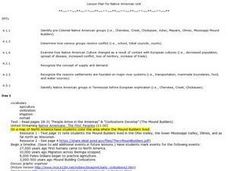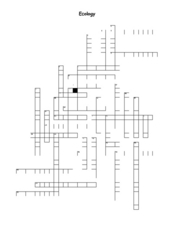Food a Fact of Life
Mini-Meals
Young cooks demonstrate their understanding of the various aspects of food preparation they have studied so far by preparing a main meal component. Koftas, spicy bean burgers, or a fish and veggie stack are among the options they may...
Curated OER
The Living Environment
For this living environment worksheet, young scholars complete a crossword puzzle given 34 clues about the various species in the environment that produce, consume and decompose. Topics also include photosynthesis, respiration, glucose,...
Curated OER
More than Beef in Burgers
Who wants a hamburger? Scholarly thinkers examine jobs in the fast food industry. Small groups discuss the jobs available in a fast food restaurant, research one of the jobs and gather information about salary, educational needs, and...
Montana State University
Everest Extremes: Biodiversity
How many animals can live in a climate as cold as Mount Everest's? Find out with a science instructional activity all about biodiversity. Activities include research, presentations, group work, coloring maps, and a simulation of a food web.
Curated OER
Meat, Fish and Poultry: Practical Application
A note-taking outline is given to learners which covers meat composition and quality, types of meat and storage, and cooking meat. By viewing pictures they learn to identify cuts of meat or poultry products. They discuss inspection and...
Science Matters
Oh Heron
Two teams—the environmentalists and herons—play four rounds of the game, Oh Heron. Using hand symbols to represent food, shelter, and water, players locate their match to produce more herons while those unmatched decompose.
LABScI
The Digestive System: Where Does Food Go?
Would you believe that your digestive system stretches to five times your height?! Help your pupils to understand this relationship as they work through the laboratory exercise. The first instructional activity of a 12-part series is a...
Curated OER
Chemistry in Foods
Students investigate foods that are indicators, and acids and bases. In this food chemistry lesson plan, students test household products with litmus paper and with food indicators. They use blackberry, onion and red cabbage indicators...
Curated OER
Green Genes: Genetically Modified Organisms in Our Food
Students investigate how and why genetically modified organisms are used as food crops. They identify the advantages and disadvantages of these crops through internet research then present their views and discuss them as a large group.
Curated OER
Getting Food
Learners complete activities to learn about the ocean food web. In this ocean life lesson, students discuss how the tides affect feeding, learn about filter feeders, grazers, predators, and scavengers. Learners then group the animals...
Curated OER
Food Contributions
Fourth graders make an alphabet book. In this food contributions instructional activity students identify foods first harvested by indigenous people. Students use the different foods that are still eaten today that were first harvested...
Curated OER
Ethical Ways to Acquire and Distribute Fish as a Food Source
Students complete a variety of activities as they examine the ethics of acquiring and distributing fish as a food source. They touch on the ethics involved in genetically modified salmon, as well.
Curated OER
An Introduction to Four Groups of Biologically Important Compounds
Students learn about the four biochemicals that are important biologically. In this biochemicals lesson plan, students identify the four major groups of biochemicals including carbohydrates, proteins, lipids and nucleic acids. They are...
Curated OER
Measuring Calories in Food
Learners measure the amount of calories in food. In this food energy lesson, students discuss what a calorie is, how our bodies use a calorie, and how many we need. Then, learners use a calorimeter to calculate the amount of energy in a...
Curated OER
Food Labels
Students study Nutrition Facts labels. In this life science activity, students explore Nutrition Facts labels, then determine and analyze the nutrients found in a variety of foods. Additionally students construct bug boxes used to...
Curated OER
Foods II Introductory Review Practical Test
Students have a lab experience preparing a recipe demonstrating the techniques learned from Foods I. They identify and explain the appropriate use and care of basic kitchen equipment. They apply the skills and techniques of proper...
Curated OER
How Much Land Does It Take To Produce Your Food?
Students calculate the amount of land required to produce the food eaten by an individual for one year. They compare the amount of land required to produce animal versus plant products. Students visualize the areas of land calculated.
Curated OER
Pre-Colonial Native American Groups
Students investigate U.S. history by researching the Internet and taking a test. In this American Indian group lesson plan, students identify the many specific Native American tribes and their geographic locations. Students research the...
Curated OER
Ecology
In this ecology activity, 6th graders will review ecology vocabulary words by circling the word that doesn't belong in each group of words for 6 questions. Then students will determine if 9 statements relating to animal and plant roles...
Curated OER
Steps to a Healthier You
Students explore the food pyramid. In this dietary health lesson plan, students examine the food pyramid on the MyPyramid.gov website and discuss healthy eating strategies. There are various links to websites in this lesson plan.
Curated OER
Get a Feel for Food
Students describe the size, shape and feel of a food hidden in a "feely bag" and then select the Food Model from a group that corresponds to the food. In a tasting party afterwards, they sample the food and describe the color, taste and...
Curated OER
Nutrition and the Food Pyramid
First graders examine the food pyramid and how healthy food effects the body. They discuss what they ate for breakfast and identify what makes a food healthy. Students analyze the food pyramid, and cut out magazine pictures of food and...
Curated OER
Food Pyramid
First graders examine the different levels of the food pyramid and plan a healthy meal. They discuss the food pyramid and read about nutrition using a variety of resources. Using Kidspiration computer software, they plan a...
Curated OER
Food and Digestion
In this food and digestion activity, students fill in the table for each food group. Students also complete a diagram illustrating the digestive system.






